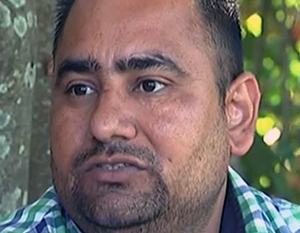Melbourne, Mar 6: An Indian national in New Zealand was assaulted, subjected to a racist tirade and told to go back to his own country during a road rage incident in Auckland, a media report said today. Narindervir Singh said he was filming from inside his vehicle when the incident happened on a weekday last week.
"I gave him a space... that lady gave me the finger. He was driving that car [pointing to a white Holden] and now he's trying to threaten me, giving me bad names," Singh says in a video which was being streamed live onto Facebook. After Singh informed the driver that he's uploading the video live, the situation escalated and Singh was abused, sworn at and told to go back to his own country.
The abuser, who is seen in video wearing a grey Everlast t-shirt, was tail-gating according to Singh, who says he simply pulled over to let him pass. The man also made derogatory remarks about Punjabi people, Newshub reported. As Singh drove off, the abuser exposed himself. "It really shocked me and after he [left], I was really shaken," Newshub quoted Singh as saying.
"I don't know what to do, it really hurts my heart...The first thing in my mind was that he might hurt me with some weapon." When Singh left, he assumed it was all over. But when he parked on a nearby side street, he says the white Holden pulled up once again and the racist rant, including the n word, continued. Another man, Bikramjit Singh, suffered similar abuse last week as he left a Papatoetoe storage facility.
A man who claimed Bikramjit was speeding yelled at him, saying: "Go back to your country - slow down! You know what the speed limit is here." Bikramjit says he wasn't speeding, is a New Zealand citizen and has lived here for more than a decade. The man who hurled abuse in that case ended up apologising in an email, blaming two alcohol beverages he'd consumed earlier that day.
But those who work with migrants say such discrimination does appear to be increasing. "We are seeing it much more openly which is a very serious concern," said Anu Kaloti from the Migrant Workers Association. "I think societies are becoming more and more intolerant, especially since (Donald) Trump was elected President of the US." Both men have filed complaints with police.






Comments
Add new comment